
Headquarters of the Federal Office for Migration and Refugees in Berlin.
Photo: nitpicker / Shutterstock.com
Germany’s Federal Office for Migration and Refugees (BAMF) published its official figures for 2023 on Monday, January 8th, revealing that asylum requests have increased significantly compared to 2022.
The data shows that there were nearly 352,000 asylum applications submitted in Germany last year, an increase of 51.1% compared to the 218,000 applications in the year before. The figure includes 23,000 ‘subsequent’ applications from migrants who have already been rejected at least once.
The statistics also make it clear that Ukrainian refugees are not included, as they are provided with a separate scheme to apply for asylum in the country. Germany hosts the largest population of Ukrainian refugees in Europe at nearly 1.2 million, or close to 29% of all people who fled Ukraine for the European Union.
The 350,000 applications showcased in the BAMF table mainly came from migrants of Middle Eastern and African origins, with the most prevalent (and often just self-reported) home countries being Syria (105,000), Turkey (63,000), and Afghanistan (54,000). Iraq, Iran, Somalia, and Eritrea are also in the top ten, as well as the Russian Federation.
The data also reveals that in 2023, the BAMF approved nearly 262,000 asylum applications, resulting in an approval rate of 51.7%. Those with rejected applications are issued a ‘request’ to leave the country, but carrying out deportations falls under state obligations and is not carried out by the federal office.
Furthermore, as the BAMF explained, rejected applicants can submit a further request for a so-called ‘tolerated’ status (for being unable to travel, for instance), and can stay in Germany while also receiving benefits. Just in the first six months of 2023, over 54,000 failed asylum seekers were issued ‘tolerance’ and state assistance in Germany.
What’s more, the published data notes that there are a further 240,000 pending asylum requests as of the end of December.
“The number of refugees trying to get into Germany is too high at the moment,” Chancellor Scholz said at the end of September, complaining that over 70% of asylum seekers have not been registered before despite traveling through multiple European countries.
To counter the influx, Scholz’s government introduced several checkpoints at the German borders, as well as floated the idea of imposing ‘flexible’ upper caps on annual asylum requests, although nothing came of it in the end.
Seeing the new data, the government instantly doubled down on its promises. “The asylum figures for 2023 show that we must consistently continue our course to limit irregular migration,” Interior Minister Nancy Faeser said in a statement.
The problem is that most German people no longer believe any of it.
According to the results of a major study published in October, the majority of Germans are highly dissatisfied with the government’s migration policies, with some 78% and 80% of respondents saying that Berlin fails to integrate refugees and deport failed asylum seekers, respectively.
Furthermore, 70% of Germans believe that reforming EU laws (with the new Migration Pact) will not solve the country’s problems, while only 27% of respondents said migration (including labor migration) might have any benefit for Germany.
It’s clear that Germans want change in the migration discourse, and they no longer see the potential for that in the current leadership. This might also explain the populist Alternative Für Deutschland’s (AfD) soaring popularity which has begun to scare establishment parties.
AfD has been in second place in the polls for six months now, its popularity is currently measured at 22%, ten points behind the center-right CDU and seven points ahead of Scholz’s Socialist Party, the largest coalition member.
“He who works is stupid, he breaks the back not for himself but for others. Over 60% of families receiving benefits in Germany do not have German passports, that’s why immigrants come!” AfD co-leader Alice Weidel commented in the Bundestag on Monday, after the data was published.
